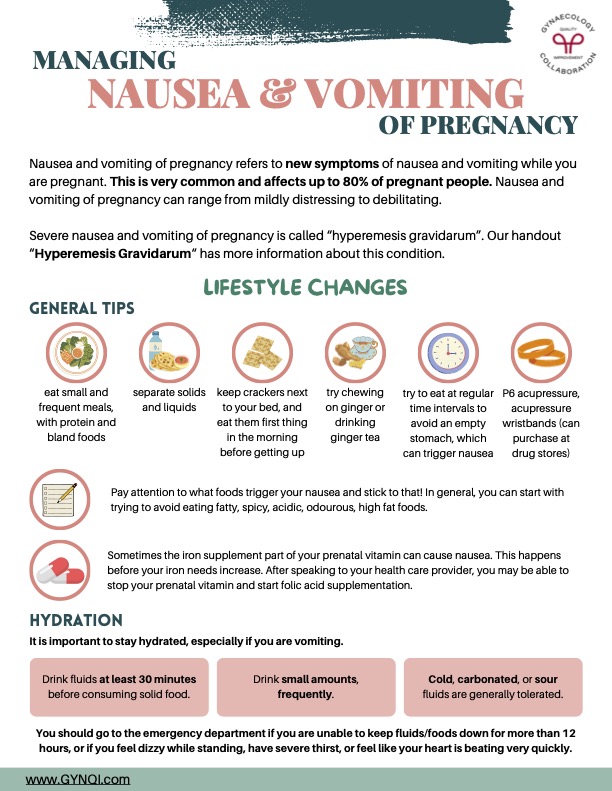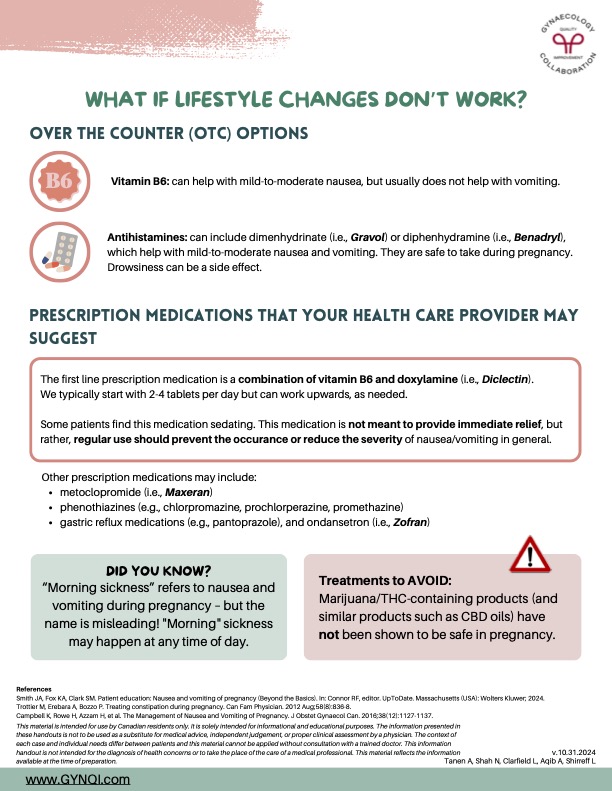
Managing Nauasea & Vomiting Of Pregnancy
Nausea and vomiting of pregnancy refers to new symptoms of nausea and vomiting while you are pregnant. This is very common and affects up to 80% of pregnant people. Nausea and vomiting of pregnancy can range from mildly distressing to debilitating.
Severe nausea and vomiting of pregnancy is called “hyperemesis gravidarum”. Our handout “Hyperemesis Gravidarum“ has more information about this condition.
Lifestyle Changes
General Tips
- Eat small and frequent meals, with protein and bland foods
- Separate solids and liquids
- Keep crackers next to your bed, and eat them first thing in the morning before getting up
- Try chewing on ginger or drinking ginger tea
- Try to eat at regular time intervals to avoid an empty stomach, which can trigger nausea
- P6 acupressure, acupressure wristbands (can purchase at drug stores)
- Pay attention to what foods trigger your nausea and stick to that! In general, you can start with trying to avoid eating fatty, spicy, acidic, odourous, high fat foods.
- Sometimes the iron supplement part of your prenatal vitamin can cause nausea. This happens before your iron needs increase. After speaking to your health care provider, you may be able to stop your prenatal vitamin and start folic acid supplementation.
Hydration
It is important to stay hydrated, especially if you are vomiting.
- Drink fluids at least 30 minutes before consuming solid food.
- Drink small amounts, frequently.
- Cold, carbonated, or sour fluids are generally tolerated.
You should go to the emergency department if you are unable to keep fluids/foods down for more than 12 hours, or if you feel dizzy while standing, have severe thirst, or feel like your heart is beating very quickly.
What If Lifestyle Changes Don’t Work?
Over The Counter (OTC) Options
- Vitamin B6: can help with mild-to-moderate nausea, but usually does not help with vomiting.
- Antihistamines: can include dimenhydrinate (i.e., Gravol) or diphenhydramine (i.e., Benadryl), which help with mild-to-moderate nausea and vomiting. They are safe to take during pregnancy. Drowsiness can be a side effect.
Prescription Medications That Your Health Care Provider May Suggest
The first line prescription medication is a combination of vitamin B6 and doxylamine (i.e., Diclectin). We typically start with 2-4 tablets per day but can work upwards, as needed.
Some patients find this medication sedating. This medication is not meant to provide immediate relief, but rather, regular use should prevent the occurance or reduce the severity of nausea/vomiting in general
Other prescription medications may include:
- metoclopromide (i.e., Maxeran)
- phenothiazines (e.g., chlorpromazine, prochlorperazine, promethazine)
- gastric reflux medications (e.g., pantoprazole), and ondansetron (i.e., Zofran)
Did You Know?
“Morning sickness” refers to nausea and vomiting during pregnancy – but the name is misleading! “Morning” sickness may happen at any time of day.
Treatments to AVOID:
Marijuana/THC-containing products (and similar products such as CBD oils) have not been shown to be safe in pregnancy.




